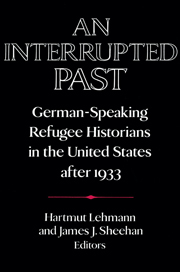Book contents
- Frontmatter
- Introduction
- PART I: Introduction
- 1 German and American Historiography in the Nineteenth and Twentieth Centuries
- 2 German Historiography during the Weimar Republic and the Émigré Historians
- 3 The Historical Seminar of the University of Berlin in the Twenties
- PART II: Introduction
- 4 Refugee Historians in America: Preemigration Germany to 1939
- 5 “Uphill Work”: The German Refugee Historians and American Institutions of Higher Learning
- 6 Everyday Life and Emigration: The Role of Women
- 7 The Special Case of Austrian Refugee Historians
- 8 Schicksalsgeschichte: Refugee Historians in the United States
- 9 German Historians in the Office of Strategic Services
- 10 The Refugee Scholar as Intellectual Educator: A Student's Recollections
- PART III: Introduction
- 11 German Émigré Historians in America: The Fifties, Sixties, and Seventies
- 12 The Americanization of Hajo Holborn
- 13 Explaining History: Hans Rosenberg
- 14 Ernst Kantorowicz and Theodor E. Mommsen
- 15 Refugee Historians and the German Historical Profession between 1950 and 1970
- Conclusion
- Index
7 - The Special Case of Austrian Refugee Historians
Published online by Cambridge University Press: 05 January 2013
- Frontmatter
- Introduction
- PART I: Introduction
- 1 German and American Historiography in the Nineteenth and Twentieth Centuries
- 2 German Historiography during the Weimar Republic and the Émigré Historians
- 3 The Historical Seminar of the University of Berlin in the Twenties
- PART II: Introduction
- 4 Refugee Historians in America: Preemigration Germany to 1939
- 5 “Uphill Work”: The German Refugee Historians and American Institutions of Higher Learning
- 6 Everyday Life and Emigration: The Role of Women
- 7 The Special Case of Austrian Refugee Historians
- 8 Schicksalsgeschichte: Refugee Historians in the United States
- 9 German Historians in the Office of Strategic Services
- 10 The Refugee Scholar as Intellectual Educator: A Student's Recollections
- PART III: Introduction
- 11 German Émigré Historians in America: The Fifties, Sixties, and Seventies
- 12 The Americanization of Hajo Holborn
- 13 Explaining History: Hans Rosenberg
- 14 Ernst Kantorowicz and Theodor E. Mommsen
- 15 Refugee Historians and the German Historical Profession between 1950 and 1970
- Conclusion
- Index
Summary
If we are to discuss the special case of Austrian refugee historians, we must consider those factors which placed these Austrians in an extraordinary position. Certainly the question of Austrian national identity, independence, and sovereignty forbids the tacit incorporation of the German-speaking Austrian historians into the general topic of this volume. Yet I think there are even more important reasons for treating the Austrians as a special case, namely (1) the time and type of exodus for Austrian scholars, which differed from that of German scholars; (2) the peculiar fashion in which historical research on the so-called Austrian exile has treated this subject.
Regarding the first reason, the exodus of scholars from the Austrian Republic, which had come into being in 1918 and was later annexed by Germany in 1938, did not occur as a result of the seizure of power by the National Socialists in Austria but instead was brought about far earlier, immediately after the collapse of the Habsburg monarchy. This exodus can - admittedly in a simplified fashion - be categorized into four phases.
First, the depressed economic situation and the intellectual climate in Austria and in Austrian universities in the 1920s caused some of the leading Austrian academics to emigrate either to the United States or to the Weimar republic before 1930. Political or racial persecution or acute personal distress were not responsible for this exodus; rather, the attractiveness of better career opportunities, both financial and intellectual, become motivating factors. Josef Redlich, Josef Schumpeter, and Hans Kelsen are examples of this first phase.
- Type
- Chapter
- Information
- An Interrupted PastGerman-Speaking Refugee Historians in the United States after 1933, pp. 109 - 115Publisher: Cambridge University PressPrint publication year: 1991



